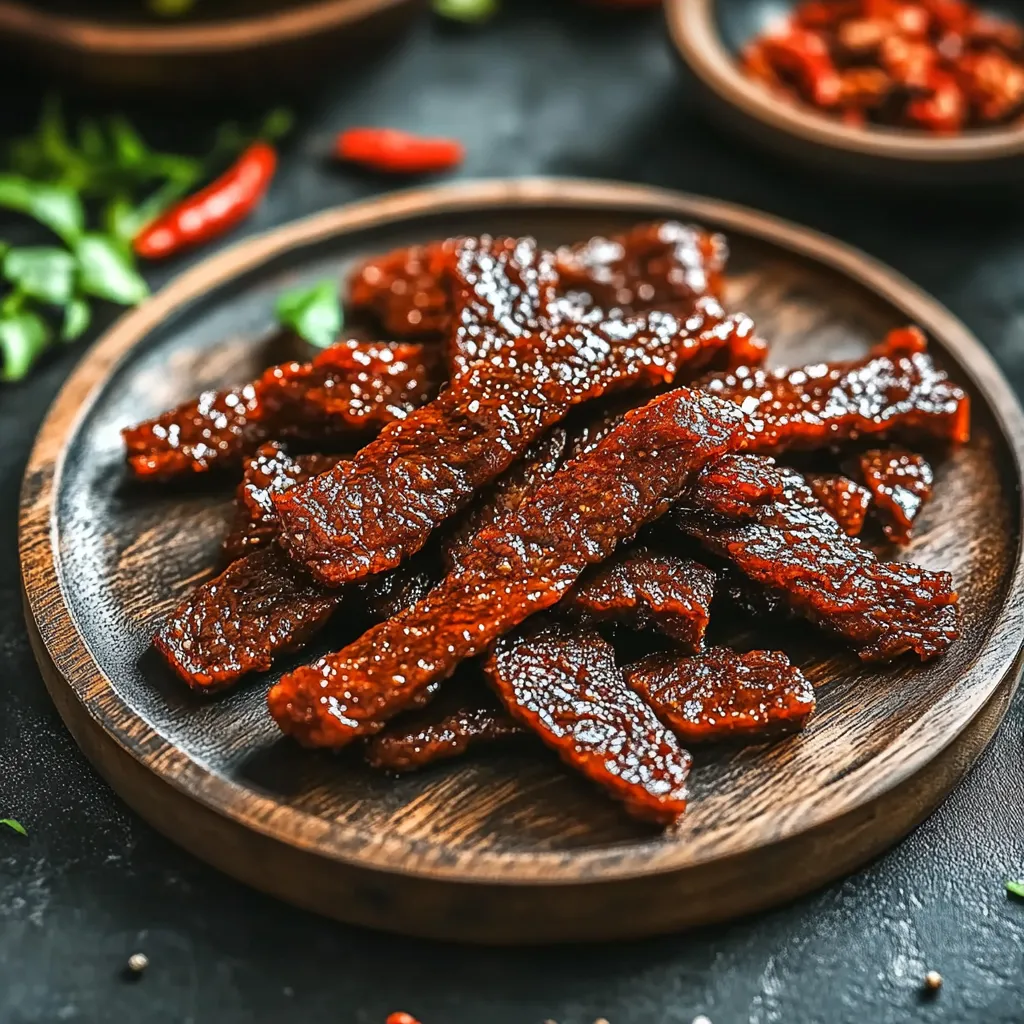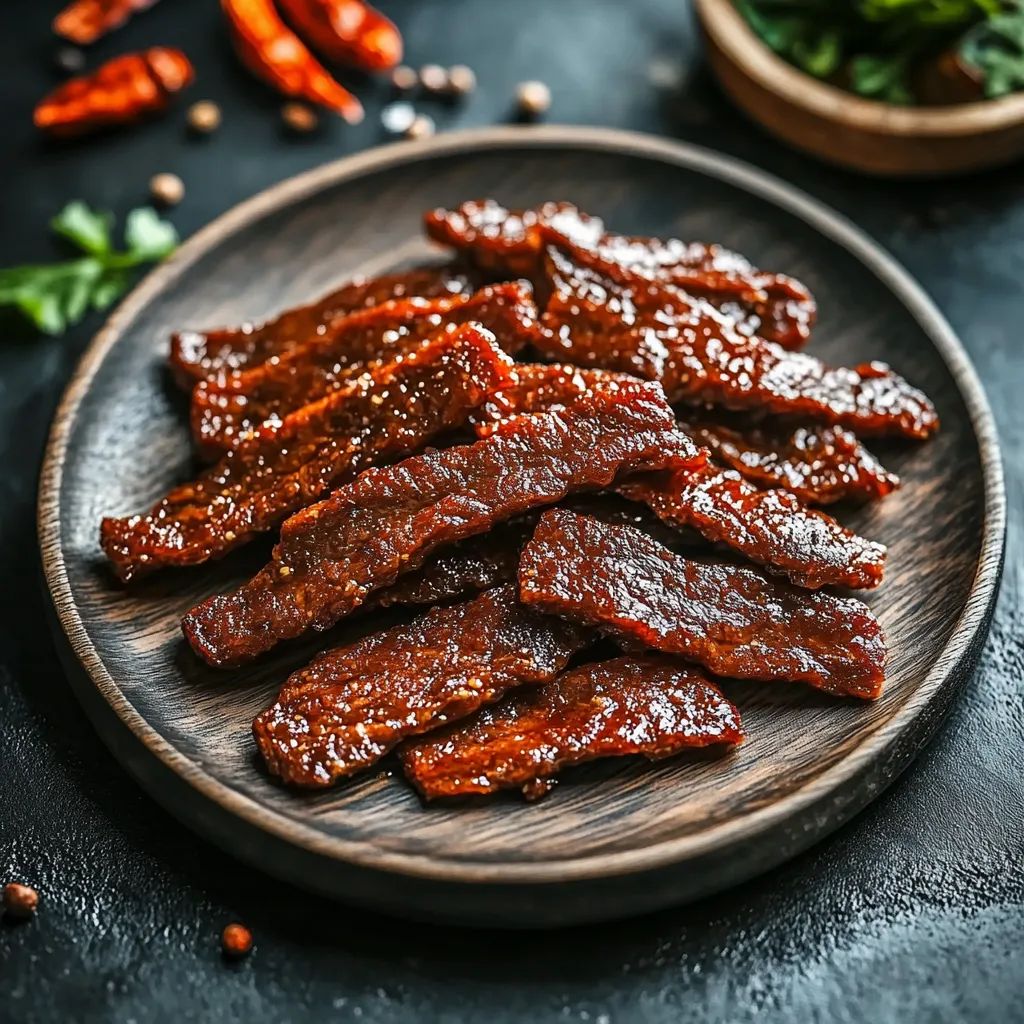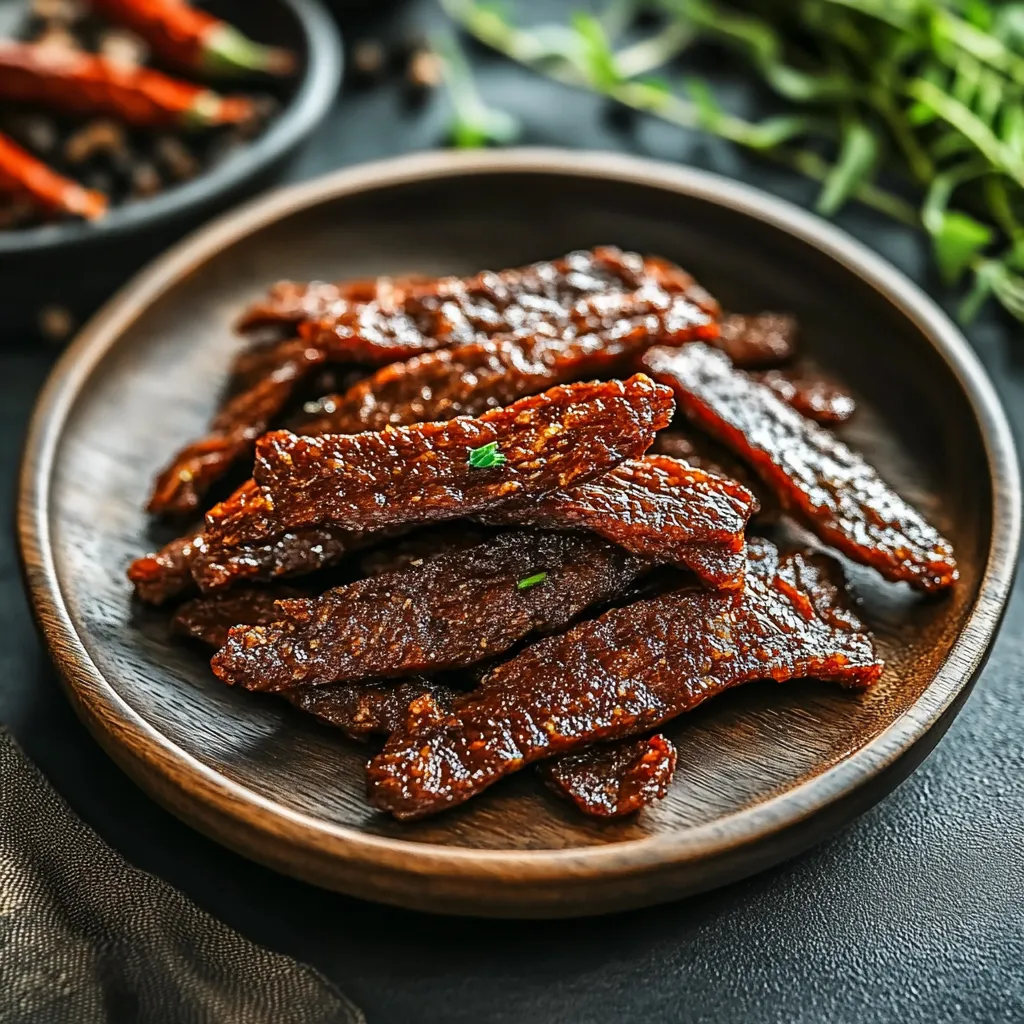 Pin it
Pin it
This air fryer beef jerky recipe transforms simple ingredients into a protein-packed snack that rivals store-bought versions at a fraction of the cost. After perfecting this technique through countless batches, I'm excited to share how your air fryer can create perfectly chewy, flavor-packed jerky with minimal effort.
I originally created this recipe during a camping trip preparation weekend when commercial jerky prices had skyrocketed. My family now requests this version exclusively, claiming they can never go back to the packaged varieties.
Ingredients
- Lean beef: Top round or flank steak creates the perfect texture with minimal fat that could spoil during storage. Look for cuts with visible grain and minimal marbling.
- Low sodium soy sauce: Provides the savory umami base without making the jerky overly salty. Traditional varieties work wonderfully but tamari creates more depth.
- Worcestershire sauce: Adds complexity with its blend of vinegar, molasses, and spices that complement the beef perfectly.
- Apple cider vinegar: Tenderizes the meat while adding subtle tanginess that balances the savory elements.
- Honey: Natural sweetener that creates beautiful caramelization during cooking and balances saltiness. Select raw honey for additional flavor nuances.
- Smoked paprika: Contributes subtle smokiness without requiring actual smoking equipment. Hungarian varieties offer exceptional color and flavor.
- Black pepper: Provides classic heat that develops during the drying process. Freshly ground makes a noticeable difference.
- Garlic powder: Infuses every bite with aromatic garlic flavor without the texture issues of fresh garlic. Toast before using for enhanced flavor.
- Onion powder: Creates depth and savory notes throughout the jerky. Look for brands without anti-caking agents for purest flavor.
- Red pepper flakes: Optional heat element that can be adjusted based on preference. Toast briefly before adding to intensify flavor.
- Ground ginger: Adds subtle warmth and complexity that enhances the other spices. Fresh ginger paste works beautifully as an alternative.
Step-by-Step Instructions
- Partial Freezing:
- Place your beef in the freezer for approximately 90 minutes until it feels firm but not frozen solid. This crucial step creates the perfect texture for clean slicing while maintaining the grain integrity. The meat should give slight resistance when pressed with your finger.
- Precision Slicing:
- Remove the partially frozen beef and identify the direction of the muscle grain. Using your sharpest knife, slice perpendicular to this grain in strips measuring exactly 1/4 inch thick. Maintaining consistent thickness ensures even drying throughout all pieces. Take your time with this step as it determines your final texture.
- Marinade Creation:
- In a medium glass or ceramic bowl, combine all marinade ingredients thoroughly with a whisk until the honey completely incorporates. The marinade should taste quite strong as flavors will concentrate during the drying process. Warming the honey slightly beforehand helps it blend more effectively.
- Thorough Marinating:
- Submerge all beef slices in the marinade, ensuring complete coverage by gently massaging the liquid into the meat. Transfer everything to a zip top bag or covered container, pressing out excess air. Refrigerate for a minimum of 4 hours, though overnight marinating produces significantly more flavorful results with deeper penetration.
- Air Fryer Preparation:
- Preheat your air fryer to its lowest setting, ideally 160°F if it has a dedicated dehydrate function or 180°F if not. Some models benefit from a quick 5 minute preheat at a higher temperature before reducing to cooking temperature. Ensure the basket is completely clean to prevent off flavors.
- Strategic Arrangement:
- Remove beef strips from marinade and pat each piece with paper towels to remove excess moisture. Arrange strips in a single layer in your air fryer basket with approximately 1/4 inch between pieces to allow proper air circulation. You may need to cook in batches depending on your air fryer size.
- Controlled Dehydration:
- Cook the jerky at the low temperature setting for 2-3 hours total. After the first hour, carefully flip each piece to ensure even drying. Begin checking for doneness at the 2 hour mark by removing a test piece and cooling for 5 minutes before bending. Perfect jerky should bend without breaking while showing no signs of rawness in the center.
- Proper Cooling and Storage:
- Transfer finished jerky to a wire rack and allow to cool completely at room temperature for at least 1 hour. The texture will continue to develop during cooling. Once fully cooled, store in airtight containers with paper towels between layers if stacking. Properly dried jerky will keep at room temperature for 1-2 weeks or refrigerated for up to 3 months.
 Pin it
Pin it
The smoked paprika in this recipe is my secret weapon. After traveling through Spain several years ago, I discovered the remarkable depth authentic pimentón adds to dishes. My family now associates this particular flavor note with our hiking trips where this jerky has become our traditional trail fuel.
Finding the Perfect Cut
Selecting the right beef cut dramatically impacts your jerky quality. Eye of round offers the leanest option with minimal trimming required, while flank steak provides slightly more flavor from its natural marbling. Regardless of cut, always look for meat with clear directional grain and minimal white fat streaks. Some specialty butchers will even slice the meat for you if you explain your jerky-making plans, saving considerable preparation time.
Temperature Matters
The low, slow cooking approach is non-negotiable for quality jerky. Higher temperatures might seem time-efficient but result in jerky that's overdried on the outside while potentially undercooked inside. If your air fryer lacks precise low-temperature controls, consider using the "reheat" setting with the door slightly propped open to reduce the effective temperature. Always use a food thermometer to verify your cooking environment stays between 160-180°F throughout the process.
Flavor Variations
While this base recipe creates outstanding traditional jerky, endless variations await experimentation. For Korean-inspired jerky, substitute gochujang for the red pepper flakes and add a tablespoon of sesame oil. Teriyaki lovers should increase the honey to two tablespoons and add pineapple juice for natural tenderizing enzymes. My family's current favorite incorporates two tablespoons of strong coffee into the marinade for remarkable depth without identifiable coffee flavor.
 Pin it
Pin it
This air fryer jerky will transform snack time, offering unmatched flavor and quality with each bite.
Frequently Asked Questions
- → What cut of beef works best for air fryer jerky?
Lean cuts like top round, flank steak, or eye of round work best for jerky. The lower fat content helps the meat dry properly and extends shelf life. Look for cuts with minimal marbling and trim visible fat before slicing.
- → How thin should I slice the beef for jerky?
Aim for slices about 1/4 inch (6mm) thick. Partially freezing the beef for 1-2 hours makes it easier to achieve consistent, thin slices. Always cut against the grain for a more tender bite.
- → How do I know when the beef jerky is done?
Properly finished jerky should be dry to the touch but still flexible enough to bend without breaking. When bent, it should crack slightly but not snap in half. If it feels spongy or moist, it needs more time in the air fryer.
- → How long does homemade air fryer beef jerky last?
When properly dried and stored in an airtight container, homemade beef jerky can last 1-2 weeks at room temperature or up to a month in the refrigerator. For longer storage, freeze it for up to 6 months.
- → Can I adjust the spice level of this jerky?
Absolutely! Customize the heat by adjusting the red pepper flakes—omit them completely for mild jerky or increase to 1-2 teaspoons for spicier results. You can also add cayenne pepper or hot sauce to the marinade for extra kick.
- → Why is my jerky too tough or too soft?
Tough jerky usually means it's been overcooked or sliced too thin. Soft or pliable jerky indicates undercooking or slices that are too thick. Consistent thickness and careful monitoring during cooking are key to perfect texture.
